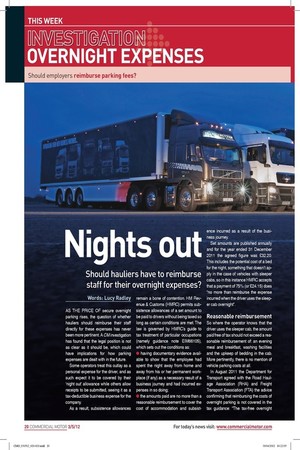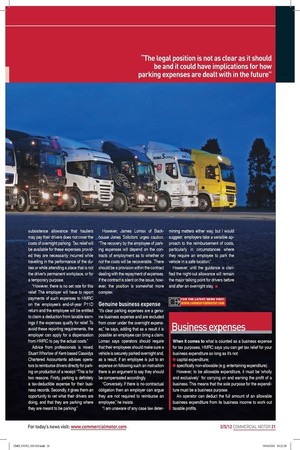OVERNIGHT EXPENSES
Page 14

Page 15

If you've noticed an error in this article please click here to report it so we can fix it.
Should employers reimburse parking fees?
Nights out
Should hauliers have to reimburse staff for their overnight expenses?
Words: Lucy Radley
AS THE PRICE OF secure overnight parking rises, the question of whether hauliers should reimburse their staff directly for these expenses has never been more pertinent. A CM investigation has found that the legal position is not as clear as it should be, which could have implications for how parking expenses are dealt with in the future.
Some operators treat this outlay as a personal expense for the driver, and as such expect it to be covered by their ‘night out’ allowance while others allow receipts to be submitted, seeing it as a tax-deductible business expense for the company.
As a result, subsistence allowances remain a bone of contention. HM Revenue & Customs (HMRC) permits subsistence allowances of a set amount to be paid to drivers without being taxed so long as certain conditions are met. The law is governed by HMRC’s guide to tax treatment of particular occupations (namely guidance note EIM66105), which sets out the conditions as: ● having documentary evidence available to show that the employee had spent the night away from home and away from his or her permanent workplace (if any) as a necessary result of a business journey and had incurred expenses in so doing; ● the amounts paid are no more than a reasonable reimbursement to cover the cost of accommodation and subsist ence incurred as a result of the business journey.
Set amounts are published annually and for the year ended 31 December 2011 the agreed figure was £32.20. This includes the potential cost of a bed for the night, something that doesn’t apply in the case of vehicles with sleeper cabs, so in this instance HMRC accepts that a payment of 75% (or £24.15) does “no more than reimburse the expense incurred when the driver uses the sleeper cab overnight”.
Reasonable reimbursement
So where the operator knows that the driver uses the sleeper cab, the amount paid free of tax should not exceed a reasonable reimbursement of: an evening meal and breakfast, washing facilities and the upkeep of bedding in the cab. More pertinently, there is no mention of vehicle parking costs at all.
In August 2011 the Department for Transport agreed with the Road Haulage Association (RHA) and Freight Transport Association (FTA) the advice confirming that reimbursing the costs of overnight parking is not covered in the tax guidance: “The tax-free overnight
subsistence allowance that hauliers may pay their drivers does not cover the costs of overnight parking. Tax relief will be available for these expenses provided they are necessarily incurred while travelling in the performance of the duties or while attending a place that is not the driver’s permanent workplace, or for a temporary purpose.
“However, there is no set rate for this relief. The employer will have to report payments of such expenses to HMRC on the employee’s end-of-year P11D return and the employee will be entitled to claim a deduction from taxable earnings if the expenses qualify for relief. To avoid these reporting requirements, the employer can apply for a dispensation from HMRC to pay the actual costs.'
Advice from professionals is mixed. Stuart Whorlow of Kent-based Cassidys Chartered Accountants advises operators to reimburse drivers directly for parking on production of a receipt. “This is for two reasons. Firstly, parking is definitely a tax-deductible expense for their business records. Secondly, it gives them an opportunity to vet what their drivers are doing, and that they are parking where they are meant to be parking.' However, James Lomax of Backhouse Jones Solicitors urges caution. “The recovery by the employee of parking expenses will depend on the contracts of employment as to whether or not the costs will be recoverable. There should be a provision within the contract dealing with the repayment of expenses. If the contract is silent on the issue, however, the position is somewhat more complex.
Genuine business expense
“It’s clear parking expenses are a genuine business expense and are excluded from cover under the overnight expenses,' he says, adding that as a result it is possible an employee can bring a claim. Lomax says operators should require that their employees should make sure a vehicle is securely parked overnight and, as a result, if an employee is put to an expense on following such an instruction there is an argument to say they should be compensated accordingly.
“Conversely, if there is no contractual obligation then an employer can argue they are not required to reimburse an employee,' he insists.
“I am unaware of any case law deter mining matters either way, but I would suggest employers take a sensible approach to the reimbursement of costs, particularly in circumstances where they require an employee to park the vehicle in a safe location.'
However, until the guidance is clarified the night-out allowance will remain the major talking point for drivers before and after an overnight stay. n










































